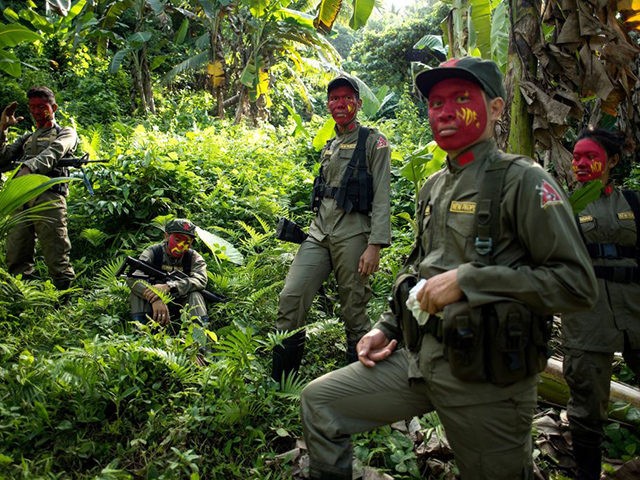The Communist Party of the Philippines (CPP), a banned political party and militant insurgency now in its fifth decade of attempting to overthrow the government, on Wednesday ordered guerrilla attacks against Chinese companies involved in local infrastructure projects.
Some of those companies are owned by the Chinese state and have been blacklisted by the U.S. government.
The CCP was not specific about which Chinese firms it wanted its militants to attack. Its statement denounced “the plunder and destruction of Philippine marine resources in the West Philippine Sea, in violation of Philippine sovereignty.”
The West Philippine Sea is another name for the South China Sea, the perilous waters China claims in their entirety despite the Philippines and other nations pressing longstanding territorial claims.
“Some of these same Chinese companies are involved in some big-ticket infrastructure projects for the construction of mining roads and dams that are encroaching deeper and deeper into the ancestral lands of the national minorities and forests in various parts of the country. These infrastructure projects not only displace thousands of peasants and minorities from their lands, they also wreak havoc [on] the natural ecosystem of the country’s remaining forests,” the CPP said, as quoted by Radio Free Asia (RFA).
A spokesman for the CPP said the unspecified Chinese companies and their security forces would be considered targets, with local guerrilla commanders deciding how to “best frustrate their plans and their plunderous operations” with violent assaults.
RFA noted that China was once an ally and supporter of the CPP, but the Filipino group “has long since repudiated links with Chinese communist doctrine in favor of their own ideological brand.”
The CPP accuses the Chinese Communist Party of drifting too far from the pure Marxist-Leninist faith, and as Wednesday’s statement indicated, it believes China has become an aggressive imperialist power — perhaps even worse than the United States, which CPP propaganda usually portrays as the greatest of imperialist threats.
The CPP is also displeased that Chinese money is flowing into the hated Philippine government and strengthening the hand of President Rodrigo Duterte. Duterte has alternately vowed to destroy the CPP and attempted to negotiate peace with it.
After a fleeting moment when it seemed like the CPP could be an uneasy ally against the rising threat of the Islamic State and allied Islamist militants, Duterte went back to classifying the Communists as the “number one threat” to Philippine national security and vowing to destroy them. In June, he said the CPP represented a far worse terrorist threat than Islamic militants.
For its part, the CPP has been through some intense factional battles over working with Duterte. Some CPP leaders see Duterte as a “fascist” or tool of “imperialism” who cannot be bargained with.
The CPP is technically the “political” wing of the Communist movement in the Philippines. The armed wing, formed in 1969, is called the New People’s Army (NPA). Wednesday’s statement took the form of the CPP ordering the NPA to “mount more frequent tactical offensives” against Chinese firms and the Philippine government, using everything from “rifles and command-detonated explosives to spears and punji sticks.” Punji sticks are sharpened stakes made out of bamboo, usually hidden in pits to maim or kill unsuspecting victims.
The Duterte administration resisted U.S. pressure to stop doing business with China, specifically stating that Chinese companies blacklisted by the U.S. would be allowed to keep working on infrastructure projects in the Philippines.
Less than two months ago, however, Duterte was threatening to fight a naval battle against China and call the U.S. Navy for help in the highly likely event he needed it. Last year, he threatened to send his soldiers on suicide missions against China if it attempted to seize control of South China Sea islands claimed by the Philippines.

COMMENTS
Please let us know if you're having issues with commenting.